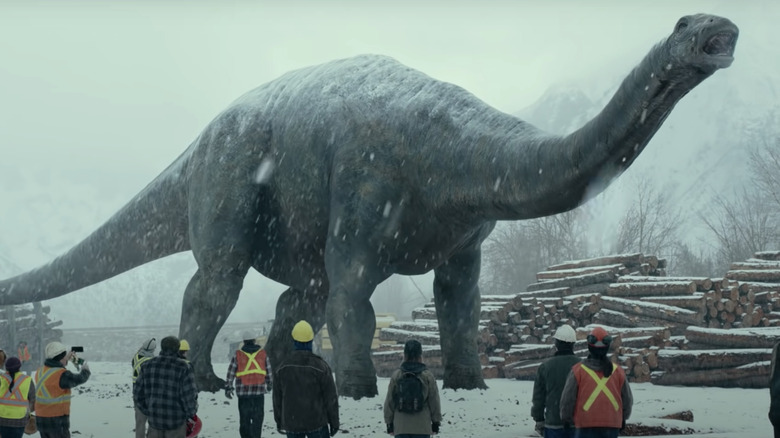Steven Spielberg's Advice For Colin Trevorrow On Jurassic World Dominion Was Very Spielbergian
"Jurassic World: Dominion" wouldn't be here if it weren't for Steven Spielberg, who obviously directed "Jurassic Park," the movie that started the whole ever-loving dino franchise. Spielberg remains an executive producer on "Dominion," and as the father of the franchise, he had some advice that proved useful for director Colin Trevorrow.
In the past, Trevorrow has said that he sees "Dominion" as "Jurassic Park 6," not just a trilogy ender but the culmination of an entire 29-year saga that began with Spielberg's first film. In our own interview with Trevorrow, he talked about combining casts: bringing back "Jurassic Park" stars Sam Neill, Laura Dern, and Jeff Goldblum, and having them link up with "Jurassic World" stars Chris Pratt and Bryce Dallas Howard. Spielberg's advice to Trevorrow was to keep the movie grounded in the human perspective of the characters these actors play. Trevorrow told The Hollywood Reporter:
"His advice often seems almost obvious, but then as you go through the film and remember what he said, you realize that he's actually given you the key. And in this film, specifically, it was, 'Remember the characters. Don't forget that these are humans. These are real people, scientists, parents going through something spectacular, something fantastic.' So that's what he's so good at. Real people in the real world, such as E.T. Indiana Jones is a professor who makes mistakes and sometimes fails and gets hurt. He established a hero that was different from what had been done up to that point when he started introducing us to these real people in real worlds. So [Dominion] isn't a superhero film, and however much I enjoy them, this is a movie about our world with one thing different."
Real people in the reel world
When Trevorrow refers to "real people in the real world, such as E.T.," he seems to be talking more about the humans who took in the extra-terrestrial, with E.T. himself being the proverbial "one thing different" in an otherwise normal world. Likewise, with Indiana Jones, Trevorrow mentions how the character gets hurt, something we see in the "Raiders of the Lost Ark" scene above, where Harrison Ford's character examines his bumps and bruises — and then takes another accidental hit to the head as Marion Ravenwood (Karen Allen) rotates the mirror.
Having Indy be physically vulnerable like this raises the stakes for his adventures and helps situate him within a quasi-realistic "reel world," you might call it. So it goes with the characters of "Jurassic Park," who display emotional vulnerabilities along with the physical ones that leave Ian Malcolm, for instance, laid up with an injury after the T. Rex escapes its paddock and attacks his jeep. /Film's Jeremy Mathai recently argued that the best scene in "Jurassic Park" doesn't involve dinosaurs at all: it's the one where park owner John Hammond (Richard Attenborough) talks about the failure of his flea circus to Dern's character, Dr. Ellie Satler, over ice cream.
Scenes like these keep the elements of the fantastic in Spielberg's films anchored to relatable human moments. Whether Trevorrow successfully recaptures any of this Spielbergian magic in "Jurassic World: Dominion" is for the viewer to decide, but it's good to know that Spielberg himself was there to help coach, and of course, his advice has applications beyond this one film to really any narrative that future storytellers seeking to follow in his footsteps might conceive.
